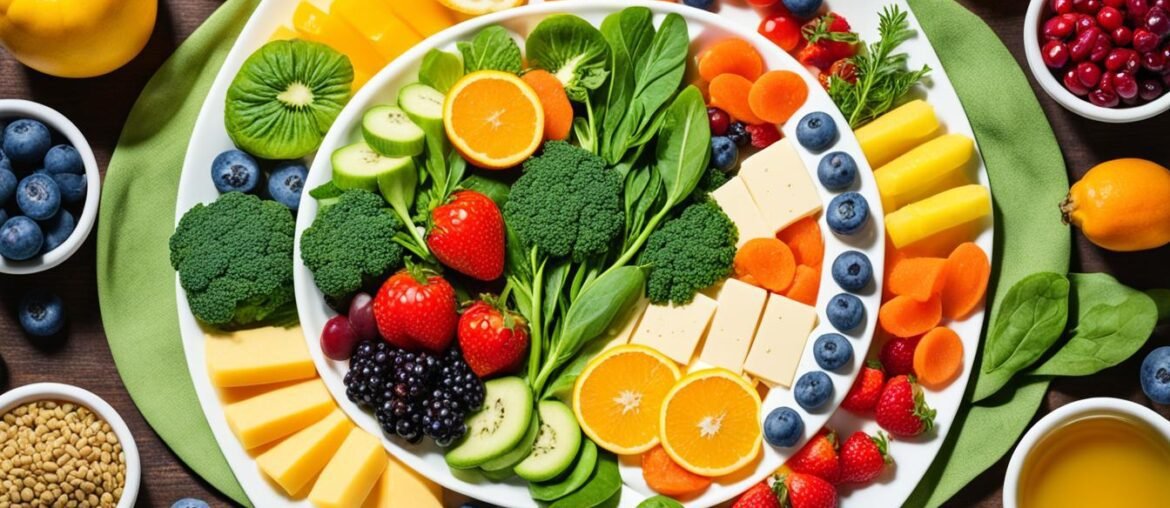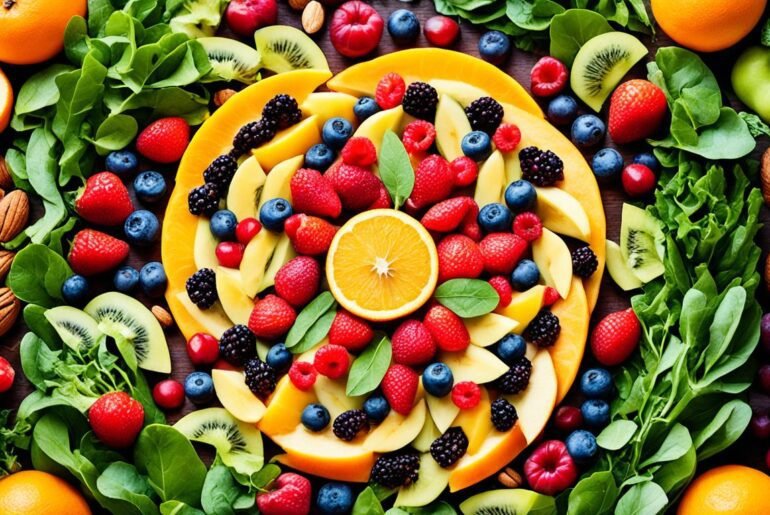As we age, our skin may start to show signs of aging, such as wrinkles and sagging. However, there are dietary tips and tricks that can help nourish your skin from within and promote a more youthful complexion. By incorporating certain foods into your diet that are high in antioxidants, healthy fats, and essential nutrients, you can support the health of your skin and protect against oxidative stress, which is a major cause of skin aging.
Key Takeaways:
- Your diet can significantly impact the appearance of your skin as you age.
- Incorporating foods rich in antioxidants, healthy fats, and essential nutrients can support skin health.
- By protecting against oxidative stress, you can help prevent skin aging.
- The following sections will highlight specific foods that promote youthful-looking skin.
Vegetables
Vegetables are an essential part of a skin rejuvenation diet. They are rich in vitamins, minerals, and antioxidants that promote skin health. Incorporating specific vegetables into your diet can provide a wide range of nutrients that support collagen production, reduce inflammation, promote bone health, and improve overall skin health.
Broccoli
Broccoli is a powerhouse vegetable that contains high levels of vitamins A, C, and K. These vitamins help to promote collagen production and support healthy skin cells. Additionally, broccoli is rich in antioxidants that protect against free radicals and reduce oxidative stress, which can contribute to premature aging.
Red Bell Peppers
Red bell peppers are a great source of vitamin C, which is essential for collagen synthesis. Collagen is a protein that provides structure and elasticity to the skin, helping to reduce the appearance of wrinkles and fine lines. Eating red bell peppers can also help protect the skin from the damaging effects of UV radiation.
Spinach
Spinach is packed with vitamins A, C, and E, as well as minerals like iron and magnesium. These nutrients help to nourish the skin and support its overall health. Spinach is also rich in antioxidants that fight against free radicals and protect against oxidative stress, which can accelerate the aging process.
Sweet Potatoes
Sweet potatoes are loaded with beta-carotene, which is converted into vitamin A in the body. Vitamin A plays a crucial role in maintaining healthy skin by promoting cell turnover and preventing the buildup of dead skin cells. This can result in smoother and more youthful-looking skin.
Watercress
Watercress is a leafy green vegetable that is packed with vitamins A, C, and K. It is also a rich source of antioxidants and minerals that support skin health. Watercress has been shown to have anti-inflammatory properties, which can help reduce redness and irritation in the skin.
Adding these vegetables to your diet can provide numerous benefits for your skin. Whether enjoyed in salads, stir-fries, or as a side dish, these vegetables offer a delicious and nutritious way to support youthful and radiant skin.
Fruit
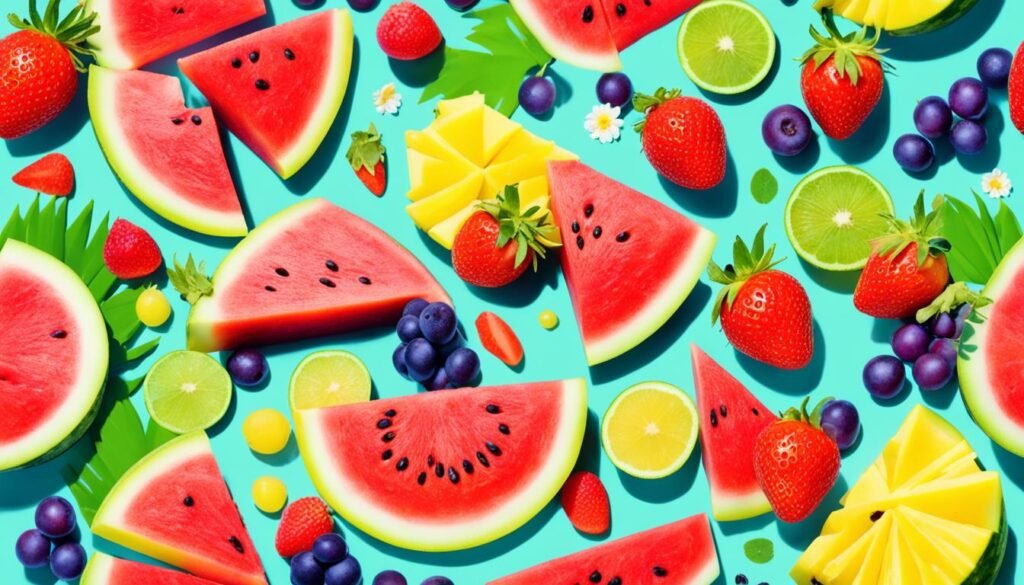
In my quest for youthful-looking skin, I have discovered the incredible benefits of incorporating fruits into my anti-aging nutrition routine. Fruits such as avocado, blueberries, and papaya are nature’s gifts for glowing skin. Let’s explore the reasons why these fruits are essential for youth-enhancing skincare.
Avocado: A Skin Health Superstar
Juicy and creamy, avocados are not only delicious but also high in healthy fats that promote skin health. These fats nourish and moisturize the skin from within, giving it a radiant and supple appearance. Avocados are also rich in antioxidants and vitamins E and C, which protect the skin from environmental damage and boost collagen production for a more youthful complexion.
Blueberries: Guardians of Collagen
When it comes to anti-aging nutrition, blueberries are at the top of my list. These tiny berries pack a powerful punch, thanks to their high concentration of antioxidants. Blueberries are particularly effective in protecting against collagen loss, which is a common cause of wrinkles and sagging skin. By incorporating blueberries into your diet, you can help maintain the elasticity and firmness of your skin, keeping it youthful and glowing.
Papaya: A Natural Digestive Aid
The sweet and juicy papaya is not only a tropical delight but also a skin-loving fruit. Papaya contains enzymes called papain and chymopapain, which aid digestion and promote a healthy gut. Improved digestion can have a positive impact on the skin, as it allows for better nutrient absorption and elimination of toxins. Plus, papaya is rich in vitamins A, C, and E, all of which contribute to healthier and more radiant skin.
By incorporating these fruits into your daily diet, you can provide your skin with the nourishment it needs to stay youthful and glowing. Remember, true beauty starts from within.
| Fruit | Benefit |
|---|---|
| Avocado | Rich in healthy fats that promote skin health High in antioxidants and vitamins for protection and collagen production |
| Blueberries | Protect against collagen loss High in antioxidants for youthful and firm skin |
| Papaya | Contains digestive enzymes for improved nutrient absorption Rich in vitamins for healthier and more radiant skin |
Enjoying these fruits on a regular basis is a delightful and effective way to enhance your skincare routine. So go ahead, indulge in nature’s sweetest gifts and let your skin glow with youthful vitality.
Nuts and Seeds
When it comes to natural anti-aging remedies, nuts and seeds are a powerhouse for promoting skin health. These tiny yet mighty foods are packed with a combination of healthy fats and antioxidants that nourish the skin from within, helping to keep it youthful and radiant.
Almonds, pistachios, and walnuts are particularly beneficial for skin health due to their high vitamin E content. Vitamin E is known for its ability to repair damaged skin tissue and protect against the harmful effects of UV radiation, which can accelerate skin aging.
Pomegranate seeds and flax seeds are also impressive sources of antioxidants that fight off free radicals—the unstable molecules that contribute to premature aging. Consuming these seeds regularly can help support healthy skin function and protect against oxidative stress, keeping your skin looking vibrant and rejuvenated.
Include a variety of nuts and seeds in your daily diet to reap their skin-boosting benefits. You can enjoy them as a snack, sprinkle them on salads or yogurt, or incorporate them into your favorite recipes.
| Nuts | Benefit |
|---|---|
| Almonds | High in vitamin E, repairs skin tissue and protects against UV damage |
| Pistachios | Provide antioxidants for skin health |
| Walnuts | Rich in vitamin E, repairs skin tissue and protects against UV damage |
| Seeds | Benefit |
|---|---|
| Pomegranate seeds | Contain antioxidants that fight free radicals and support healthy skin |
| Flax seeds | Rich in antioxidants and omega-3 fatty acids, promote skin hydration and smoothness |
Include Nuts and Seeds in Your Skin-Boosting Diet
- Snack on a handful of almonds or pistachios during the day.
- Add walnuts to your breakfast smoothie or sprinkle them on top of your oatmeal.
- Sprinkle pomegranate seeds on salads or yogurt for a burst of flavor and antioxidants.
- Incorporate flax seeds into your baking recipes or blend them into your morning smoothie.
By incorporating nuts and seeds into your diet, you can harness their natural anti-aging properties and promote healthy, youthful-looking skin.
Extra Virgin Olive Oil
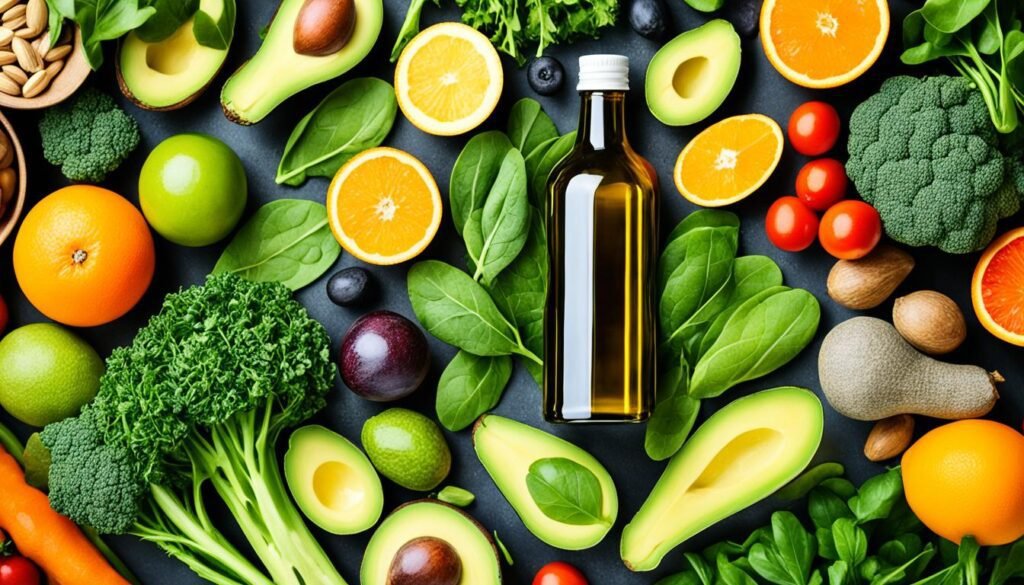
When it comes to maintaining a healthy and vibrant complexion, extra virgin olive oil is an essential component of any anti-aging skincare routine. This versatile oil is not only great for cooking but also offers numerous benefits for skin health.
One of the key reasons why extra virgin olive oil is highly regarded for its skin-friendly properties is its rich content of healthy fats and antioxidants. These compounds work together to combat inflammation and oxidative damage, which are both major contributors to aging skin.
Consuming olive oil has also been associated with a reduced risk of chronic diseases like heart disease and type 2 diabetes. The anti-inflammatory properties of olive oil, along with its powerful antioxidants, can play a significant role in protecting the skin from aging and keeping it healthy and vibrant.
Moreover, extra virgin olive oil is packed with polyphenols, a type of antioxidant that helps fight free radicals and protects the skin from environmental stressors. By incorporating olive oil into your diet regularly, you can improve the overall health and appearance of your skin.
| Benefits of Extra Virgin Olive Oil for Skin Health | |
|---|---|
| Reduces Inflammation: | Olive oil’s anti-inflammatory properties help soothe skin and reduce redness. |
| Protects Against Oxidative Damage: | The antioxidants in olive oil combat free radicals, preventing damage to skin cells. |
| Nourishes and Hydrates: | The healthy fats in olive oil moisturize and nourish the skin, promoting a youthful glow. |
| Supports Collagen Production: | Olive oil provides essential nutrients that support collagen synthesis, enhancing skin elasticity and reducing the appearance of fine lines and wrinkles. |
| Improves Skin Texture: | Regular consumption of olive oil can lead to smoother, more radiant skin. |
By incorporating extra virgin olive oil into your anti-aging skincare routine, you can harness its powerful properties to promote healthy and youthful skin. Whether used in cooking, as a salad dressing, or even as a natural moisturizer, this oil is a valuable addition to any skincare regimen.
Green Tea
When it comes to anti-aging skincare tips, one ingredient that should not be overlooked is green tea. Green tea is a powerhouse of antioxidants, particularly polyphenols, which have been shown to have numerous benefits for the skin.
The antioxidants in green tea help fight against free radicals, which are unstable molecules that can cause damage to the skin cells and accelerate aging. By neutralizing these free radicals, green tea helps protect the skin from oxidative stress and minimize the signs of aging.
Furthermore, green tea contains catechins, a type of polyphenol, which have been found to promote healthy skin regeneration and improve skin elasticity. These catechins can help reduce the appearance of fine lines and wrinkles, giving the skin a more youthful and radiant look.
Research has also suggested that green tea may have a protective effect against the harmful UV rays of the sun. The polyphenols in green tea can help shield the skin from sun damage, reducing the risk of sunburn and other skin-related issues caused by prolonged sun exposure.
Incorporating green tea into your daily routine can be as simple as enjoying a hot cup of tea or adding it to your favorite smoothie or salad. Its refreshing taste and numerous health benefits make it a popular choice for individuals looking to improve their overall well-being, including the health of their skin.
I never start my day without a cup of green tea. Its antioxidants help protect my skin from damage and keep it looking youthful. – Emma
| Benefits of Green Tea for Skin | Recommended Consumption |
|---|---|
| Reduces signs of aging | 2-3 cups per day |
| Protects against sun damage | 1-2 cups per day |
| Promotes healthy skin regeneration | Can be used topically as a facial mist |
Overall, green tea is a valuable addition to any anti-aging skincare routine. With its abundance of antioxidants and potential protective effects, it can help promote healthier and more youthful-looking skin.
Try this Green Tea Skin Protection Smoothie:
- 1 cup brewed green tea, chilled
- 1 ripe banana
- 1 cup spinach
- 1/2 cup frozen blueberries
- 1 tablespoon honey or maple syrup (optional for sweetness)
Blend all ingredients together until smooth and enjoy!
Fatty Fish
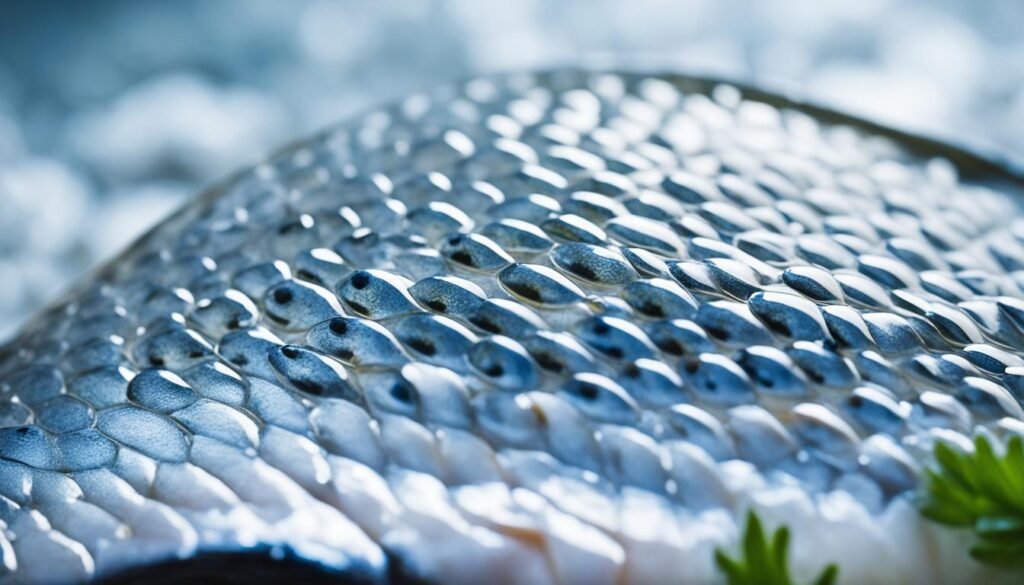
One essential tip for younger-looking skin is to incorporate fatty fish into your diet. Fatty fish, such as salmon, is packed with omega-3 fatty acids that offer numerous benefits for skin health. These healthy fats help reduce inflammation in the body, which can contribute to a more youthful complexion.
Omega-3 fatty acids also play a crucial role in maintaining a strong skin barrier, helping to prevent moisture loss and keep your skin hydrated. By including fatty fish in your diet, you can improve skin elasticity and decrease skin inflammation caused by various factors.
Furthermore, salmon contains astaxanthin, a powerful carotenoid antioxidant that provides additional skin benefits. Astaxanthin helps improve skin elasticity and hydration, promoting a more youthful appearance.
Dark Chocolate or Cocoa
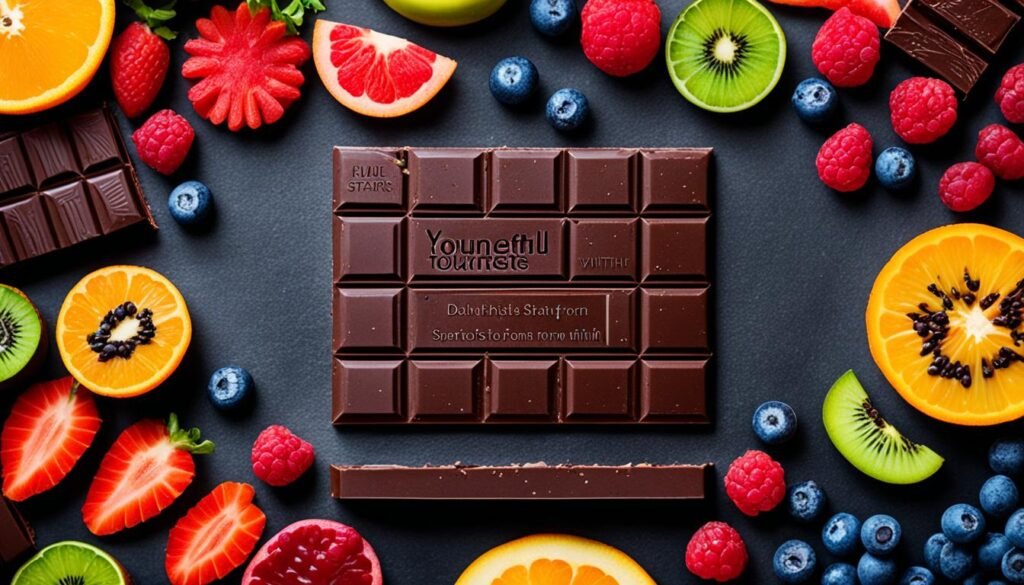
Incorporating dark chocolate or cocoa into your diet can have potential benefits for maintaining youthful skin. These indulgent treats contain flavanols, powerful antioxidants that may help protect the skin from damage caused by free radicals. When consumed in moderation, dark chocolate has been associated with improved skin elasticity and a reduction in facial wrinkles. However, it is important to note that more research is needed to fully understand the specific effects of dark chocolate on skin health.
While dark chocolate may offer potential benefits for your skin, it is important to consume it in moderation as part of a balanced diet. Opt for dark chocolate with a high cocoa content, as it generally contains more antioxidants and less added sugar. Remember, maintaining a varied and nutritious diet overall is key for promoting youthful skin and overall well-being.
Vegetables
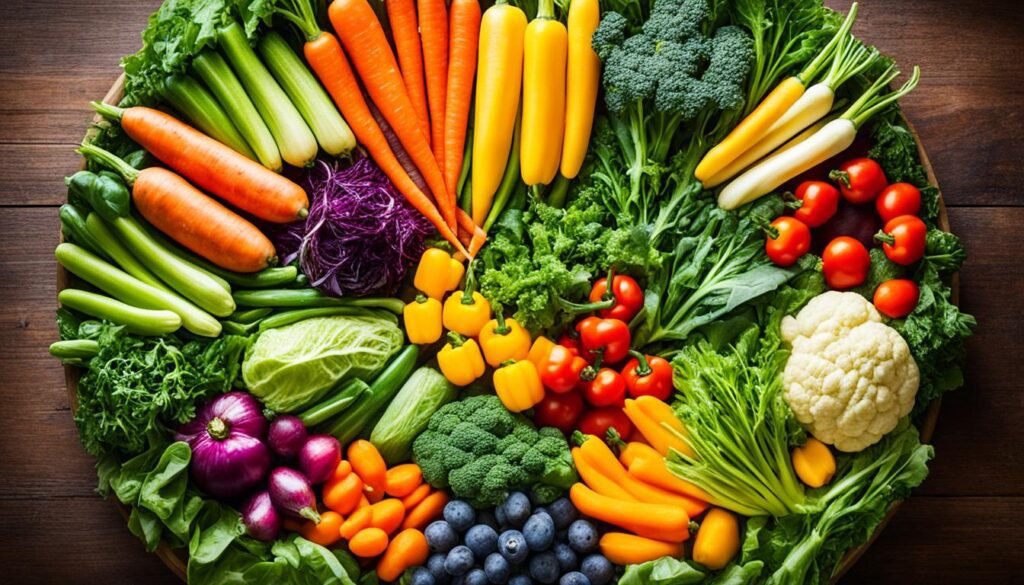
In addition to the vegetables mentioned earlier, there are other vegetables that can benefit your skin. Leafy greens like kale and Swiss chard are high in vitamin C, which is essential for collagen production. Bell peppers and tomatoes are also great sources of vitamin C and provide additional antioxidants for skin health.
Additional Vegetables for Youthful Skin:
- Kale
- Swiss chard
- Bell peppers
- Tomatoes
Vitamin C plays a critical role in collagen synthesis, a protein that helps maintain skin’s elasticity and firmness. Incorporating these vegetables into your diet can provide the necessary nutrients for a youthful glow.
Flax Seeds
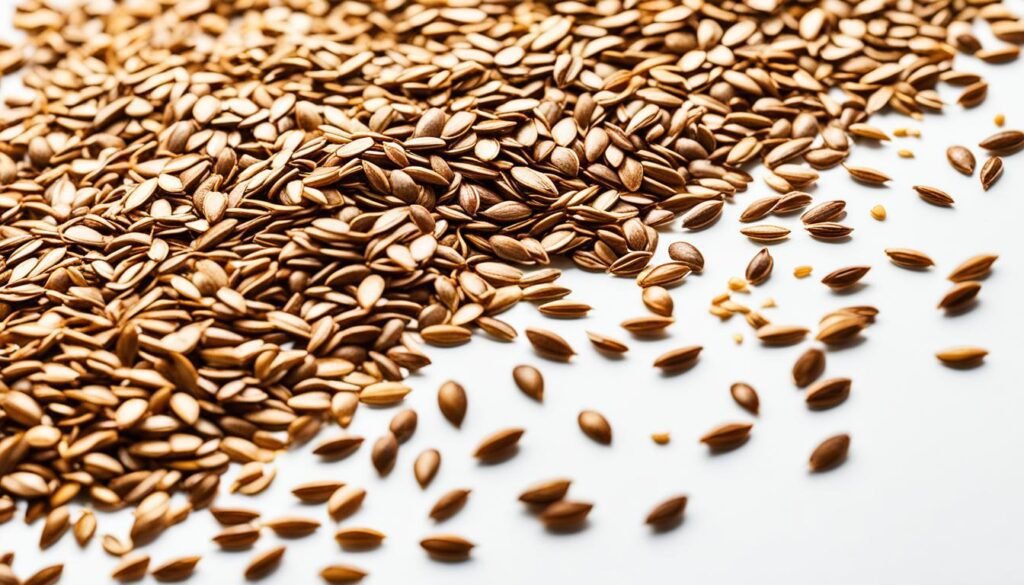
Flax seeds are a powerhouse when it comes to promoting skin health and supporting an effective anti-aging skincare routine. These tiny seeds are packed with nutrients that nourish your skin from the inside out, helping to maintain its youthful appearance. Let’s explore the benefits of incorporating flax seeds into your diet.
Rich in Lignans
Flax seeds are an abundant source of lignans, which are antioxidants that fight against free radicals in the body. Free radicals can damage your skin cells and contribute to the signs of aging. By consuming flax seeds, you can help combat oxidative stress and protect your skin from premature aging.
High in Omega-3 Fatty Acids
Omega-3 fatty acids are essential for maintaining healthy skin cell membranes. Flax seeds are one of the best plant-based sources of omega-3s, which play a crucial role in promoting skin hydration, elasticity, and smoothness. Including flax seeds in your diet can help improve your skin’s overall health and appearance.
Incorporating Flax Seeds Into Your Diet
There are several ways you can incorporate flax seeds into your daily meals. You can sprinkle ground flax seeds onto your morning cereal or yogurt, blend them into smoothies, or use them as an ingredient in baking recipes. Be sure to store flax seeds in an airtight container in the refrigerator to maintain their freshness and nutritional value.
Remember to start with small amounts of flax seeds and gradually increase your intake to avoid any digestive discomfort. Consult with a healthcare professional or nutritionist for personalized advice on incorporating flax seeds into your anti-aging skincare routine.
Pomegranates
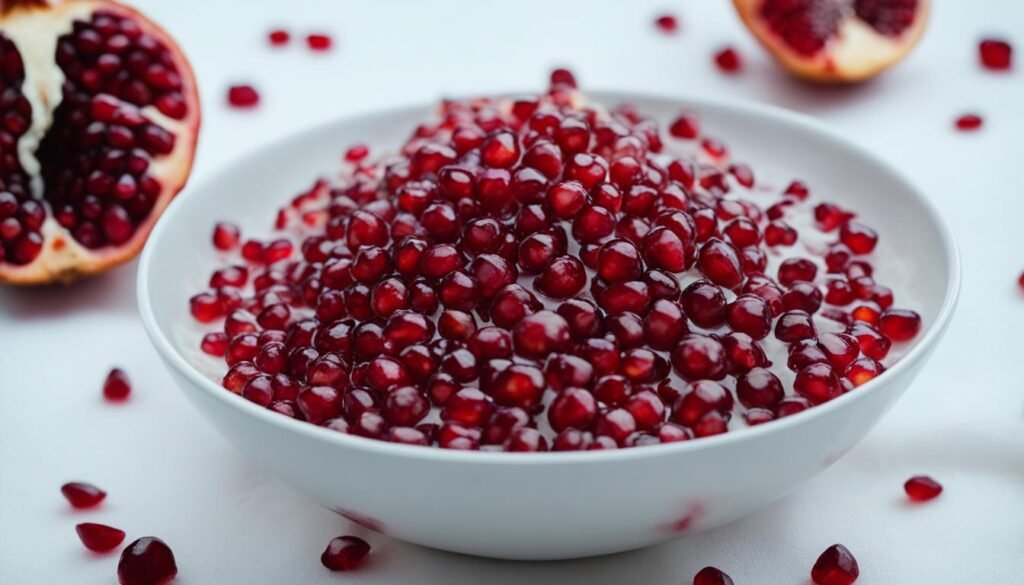
Pomegranates are a natural anti-aging remedy that can work wonders for your skin health. These vibrant fruits are known for their high antioxidant content, which helps repair and protect the skin from environmental damage. Consuming pomegranate seeds or drinking pomegranate juice regularly can provide numerous benefits for your skin.
One of the key benefits of pomegranates is their ability to reduce UV skin damage. The antioxidants found in pomegranates have been shown to neutralize harmful free radicals caused by sun exposure, helping to prevent premature aging and skin damage.
Pomegranates are also rich in nutrients that support collagen production, such as vitamin C. Collagen is a protein that maintains the structure and elasticity of the skin, and its production naturally decreases as we age. By promoting collagen synthesis, pomegranates can help reduce the signs of aging, such as wrinkles and sagging skin.
In addition to their anti-aging properties, pomegranates also have other health benefits. They are known to have anti-inflammatory properties, which can help reduce redness and irritation in the skin. Pomegranates are also a good source of vitamins and minerals that support overall skin health.
There are many delicious ways to incorporate pomegranates into your diet. You can enjoy the juicy seeds as a snack, sprinkle them over salads or yogurt, or blend them into smoothies. Drinking pomegranate juice is another convenient option to reap the benefits of this superfruit.
With their powerful antioxidants and skin-nourishing properties, pomegranates are a natural choice for improving your skin health and fighting the signs of aging. Make pomegranates a regular part of your diet to enjoy their beauty-enhancing benefits.
Conclusion
In conclusion, incorporating specific foods into your diet can support your skin’s health and promote a more youthful appearance. By following an anti-aging skin care diet and making these foods a regular part of your eating routine, you can enhance the health and appearance of your skin as you age.
Vegetables, fruits, nuts and seeds, extra virgin olive oil, green tea, fatty fish, dark chocolate or cocoa, and flax seeds are all key components of an anti-aging diet. These foods provide essential nutrients, antioxidants, and healthy fats that nourish the skin from within.
Additionally, pomegranates offer unique benefits for skin health. They are packed with antioxidants that can help repair and protect the skin from environmental damage, reduce UV skin damage, and promote collagen production, all of which can help reduce the signs of aging.
By incorporating these anti-aging diet tips into your lifestyle, you can support your skin’s health and promote a more youthful appearance for years to come.
FAQ
What are some anti-aging skin care diet tips?
Incorporating specific foods into your diet can support your skin’s health and promote a more youthful appearance. Vegetables, fruits, nuts and seeds, extra virgin olive oil, green tea, fatty fish, dark chocolate or cocoa, and flax seeds all provide essential nutrients, antioxidants, and healthy fats that nourish the skin from within.
Which vegetables are beneficial for skin rejuvenation?
Broccoli, red bell peppers, spinach, sweet potatoes, and watercress are excellent vegetables that promote skin health. They provide a wide range of nutrients that support collagen production, reduce inflammation, promote bone health, and improve overall skin health.
What fruits should I incorporate into my diet for youthful skin?
Avocado, blueberries, and papaya are great fruits for promoting youthful skin. Avocado is high in healthy fats, blueberries protect against collagen loss, and papaya contains enzymes that improve digestion and support overall health.
How can nuts and seeds contribute to skin health?
Almonds, pistachios, walnuts, pomegranate seeds, and flax seeds are excellent sources of healthy fats and antioxidants that support skin health. They provide vitamin E, antioxidants, and omega-3 fatty acids that repair skin tissue, protect against UV damage, and fight free radicals.
What are the benefits of extra virgin olive oil for the skin?
Extra virgin olive oil is rich in healthy fats and antioxidants that reduce inflammation and oxidative damage in the body. Consuming olive oil has been linked to a lower risk of chronic diseases like heart disease and type 2 diabetes, and it can also help protect the skin from aging and keep it healthy and vibrant.
How does green tea contribute to skin protection?
Green tea is packed with antioxidants, particularly polyphenols, that help fight free radicals and protect the skin from sun damage and environmental stressors. The antioxidants in green tea have been shown to minimize signs of aging and promote healthy skin renewal.
How does fatty fish support skin health?
Fatty fish like salmon are rich in omega-3 fatty acids, which help reduce inflammation and support skin health. These healthy fats contribute to a strong skin barrier and can decrease skin inflammation caused by various factors. Additionally, salmon contains astaxanthin, a carotenoid antioxidant that improves skin elasticity and hydration.
Can dark chocolate or cocoa improve skin health?
Dark chocolate or cocoa contains flavanols, which are powerful antioxidants that may have skin-protecting benefits. Consuming dark chocolate in moderation has been associated with improved skin elasticity and reduced facial wrinkles. However, more research is needed to fully understand the effects of dark chocolate on skin health.
What other vegetables are beneficial for skin health?
Leafy greens like kale and Swiss chard are high in vitamin C, which is essential for collagen production. Bell peppers and tomatoes are also great sources of vitamin C and provide additional antioxidants for skin health.
How can flax seeds benefit the skin?
Flax seeds are rich in lignans, antioxidants that fight free radicals and support overall health. They are also a great source of omega-3 fatty acids, which help maintain healthy skin cell membranes. Incorporating flax seeds into your diet can promote skin hydration and smoothness.
What are the benefits of pomegranates for skin health?
Pomegranates are packed with antioxidants that can help repair and protect the skin from environmental damage. They have been shown to reduce UV skin damage and promote collagen production, which can help reduce the signs of aging. Consuming pomegranate seeds or drinking pomegranate juice can be a delicious way to support your skin’s health.

